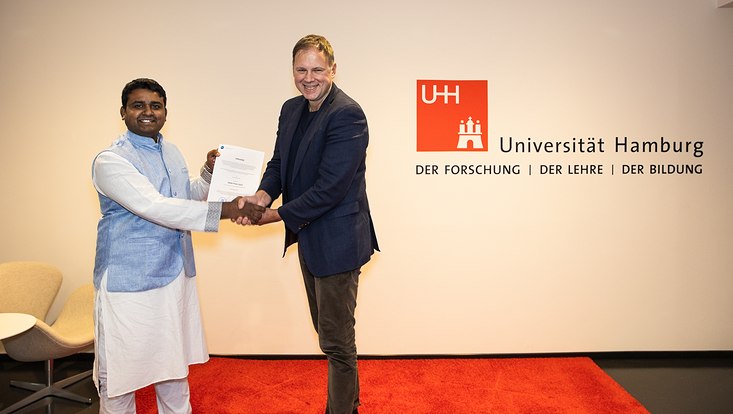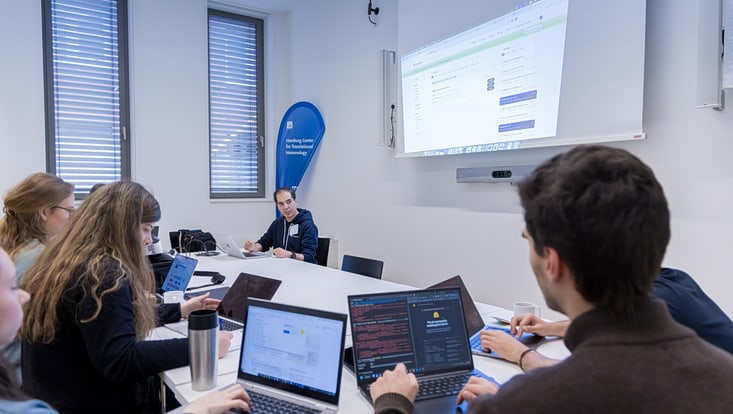12 December 2023, by Marie Schlicht

Photo: UHH/Esfandiari
Prizewinner Sadequle Islam and the University’s president Prof. Dr. Hauke Heekeren at the DAAD award ceremony on 4 December 2023
Sadequle Islam graduated from the Faculty of Education and is this year’s winner of the German Academic Exchange Service (DAAD) Prize. The prize is awarded to international students who have demonstrated exceptional academic performance as well as social and intercultural involvement. Islam sat down for an interview to talk about his doctorate, his plans for the future, and the foundations he has set up.
You come from Bangladesh but have now been in Hamburg for 3 years. Why did you want to do a doctorate at Universität Hamburg?
After I completed my bachelor’s and master’s at Dhaka University, I started teaching. I realized, however, that I missed doing research and I applied for doctoral programs in the United States, Great Britain, Canada, and Germany. I chose Hamburg for my current supervisor, Ms. Melo Pfeifer. My main criterion when deciding was to work together with outstanding professors in my field. Melo Pfeifer is one of the best in the field of applied linguistics and “translanguaging.” That’s why I chose Universität Hamburg.
How can we understand your research field, “translanguaging”?
Translanguaging is a linguistic and teaching concept. The idea is that multilingual people do not use only one language to express themselves but that they combine several languages. In the field of education, in which I am researching the concept, we use this approach to improve the linguistic comprehension and expression of our students. Multilingual speakers should—for example, when they learn English—not only be permitted to speak English but several other languages in order to learn English better.
And what exactly are you researching in this area?
I am conducting a comparative study between Germany and Bangladesh. I am looking at how English is taught at universities and which translanguaging practices teachers use. To find that out, I am conducting interviews with teachers in both countries and observing English lessons in the classroom. In Germany, I have gathered almost all the data; next year, I will continue in Bangladesh.
I have already been able to observe a few problems: for example, in Germany there are many students who have very different native languages. English is often the third language that they learn. The teachers told me in interviews that they allow students in the classroom to speak their own language but in practice, I observed something different. To learn English, however, it is not helpful when speaking your native language is prohibited. That’s why new teaching methods need to be introduced. That is what I am researching.
What are your subsequent plans?
After I finish my doctorate, I would like to go back to Bangladesh to share and use my new knowledge. I would also like to work as a postdoc to continue researching topics for which my doctoral thesis wasn’t sufficient.
The DAAD Prize is also awarded for social commitment. What areas are you active in?
Bangladesh is a developing country and many people live in poverty. This is why I founded the charitable organization MBSK (Mawlana Baset—Salma Khatun) Foundation. The goal is to improve the living conditions of marginalized people. We want to advance rural development and social security. I am trying to support the foundation with my salary and my scholarship as well as possible.
In Hamburg, I advocate for Bangladeshis living here. I co-founded the Bangladesh North Bengal Community Germany. We offer regular advising appointments, especially for students who are new here and have problems finding housing or who are not yet coping with their studies. We also organize a cultural program.
I am also a member of the Islamische Gemeinschaft für Bildung und Soziales and an alumnus of Dialogue Perspectives, a European platform that focuses on a new form of exchange between people of different faiths and world views. I try to get socially involved everywhere I go.


